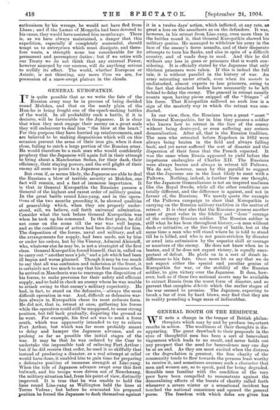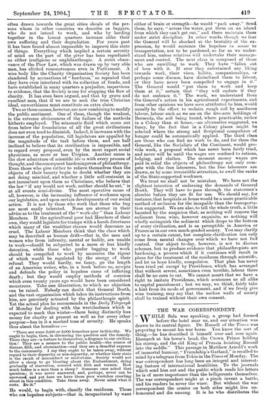often drawn towards the great cities shoals of the per-
sons whom in other countries we describe as beggars, who do not intend to work, and who by herding together in the lowest quarters increase alike their own suffering and, their degradation. For years past it has been found almost impossible to improve this state of things. Everything which implied a certain severity of mind on the part of the giver has been repudiated as either irreligious or unphilanthropic. A strict obser- vance of the Poor Law, which was drawn up by very able men, has elicited remonstrances even in Parliament. A wise body like the Charity Organisation Society has been slandered by accusations of "hardness," so repeated that they have even interfered with its collection of funds, and have established in many quarters a prejudice, impervious to evidence, that the Society is one for stopping the flow of charity. It has even been argued, and. that by grave and excellent men, that if we are to seek the true Christian ideal, unworthiness must constitute an extra claim.
Two or three causes, however, are now combining to modify the public sentiment. One of them, though the weakest, is the extreme obviousness of the failure of the methods hitherto employed. The miasmatic fluid which oozes out from below the foundations of all the great civilisations does not even tend to diminish. Indeed, it increases with the increase of the population, till legislators are appalled by the magnitude of the task before them, and are half inclined to believe that its sterilisation is impossible, and to regard. every proposal, even by the most expert social physicians, as more or less Utopian. Another cause is the slow admixture of scientific idels with every process of thought, and the consequent hardeningeven of philanthropy. Even those who give rather to relieve themselves than the objects of their bounty begin to doubt whether they are not doing mischief, and. whether a little self-restraint is not incumbent upon them as Christians, who believe that the law" if any would not work, neither should he eat," is at all events semi-divine. The most operative cause of all, however, is the increasing influence of workmen upon our legislation, and upon certain developments of our social action. It is not by those who work that those who beg are most easily tolerated. None are sterner in their advice as to the treatment of the " work-shy " than Labour Members. If the agricultural poor had Members of their own, they would legislate for tramps with a harsh directness which many of the wealthier classes would denounce as cruel. The Labour Members think that the class which may be described as human drift—that is, the men and women who from infirmity, mental or bodily, are unable to work—should. be subjected. to a more or less kindly detention, while those who prefer begging to work should be compelled to work by measures the rigour of which would. be regulated by the energy of their refusal. They would hardly, we fancy, go the length of an American writer, who, in a book before us, accepts and defends the policy in hopeless cases of inflicting death ; but they would. employ methods of coercion which even twenty years ago would have been considered. monstrous. Take one illustration, to which no objection can be raised. Nobody can doubt that General Booth, and the vast organisation which takes its instructions from him, are genuinely actuated by the philanthropic spirit. Yet the actual plan he recommends in the Daily Telegraph of Monday for dealing with the wretchedness which is expected to mark this winter—there being distinctly less money for charity at present as well as for every other purpose—has in it a marked tone of severity. He speaks thus about the homeless :— " There are some 2,000 or 3,000 houseless poor in this city. We ought to begin, then, in discussing the question and the remedy. There they are—a torture to themselves, a disgrace to our civilisa- tion! They' are a menace to the public health—the source of disease, filth, and abomination—and they are a dreadful expense to the community. I say they ought to be taken away, without regard to their depravity or non-depravity, or whether their state is the result of misconduct or misfortune. Society would not allow a sheep to go bleating about the Embankment, dying gradually of starvation, covered with filth and vermin. How much better is a man than a sheep ? Someone once asked that question ; it was never answered, and, perhaps, never can be answered, and yet here we have these poor wretches crawling about in this condition. Take them away. Never mind what it costs. Do it."
He would, to begin with, classify the residuum. Those who are hopeless subjects—that is, incapacitated by want either of brain or strength—he would "pack away." Send. them, he says, "across the water, put them on an island from which they can't get out," and there maintain them under strict discipline. In other words, though we fear the General will be shocked at the brutality of the ex- pression, he would sentence the hopeless ea masse to transportation, not to be pardoned, so far as we under- stand him, unless relatives will undertake their manage, ment and control. The next class is composed of those who are unwilling to work. They have "fallen out of love with it. If ever they entertained any liking towards work, their vices, habits, companionships, or perhaps some disease, have disinclined them to labour, or they have never been compelled to engage in it." The General would "put them to work and keep them at it," certain that "they will endure if they do not embrace it." The work, we understand from the General's action in his agricultural experiments, and. from other opinions we have seen attributed to him, would usually be the effort to reclaim rough soil by assiduous labour, labour such as we see on the five-acre holdings of Bermuda, the soil being found, where practicable, rather in a Colony than at home,—an alternative suggested, we fancy, by the fact that in a Colony places might be selected where the strong and Scriptural compulsion of hunger could be automatically applied. The third class are those who can find no work to do, and for them the General, like the Socialists of the Continent, would pro- vide work, a proposal which has never been fairly tried, and never will be until the wages are confined to rations, lodging, and clothes. The moment money wages are paid in relief the objects of philanthropy not only com- pete with the free labourers, but the free labourers are drawn, as by some irresistible attraction, to swell the ranks of the State-supported workmen. .
We trust we shall not be mistaken. We have not the slightest intention of endorsing the demands of General Booth. They will have to pass through the statesmen's alembic before they are fit for use. We should say, for, instance, that hospitals at home would be a more practicable method of seclusion for the incapable than the transporta- tion suggested. We are also, to tell the whole truth, a. little haunted by the suspicion that, as nothing will remove the sediment from wine, however exquisite, so nothing will wholly extinguish the sediment which drops to the bottom of every civilisation, and. is as perceptible in America or France as in our own much-graded society. You may clarify, up to a certain extent, but complete clarification can only, come from mental changes over which we have not full control. Our object to-day, however, is not to discuss, schemes, but to produce evidence that philanthropists are hardening, a process which if it continues will result in plans for the treatment of the residuum through scientific, and let us hope kindly, compulsion. That plan has never been tried. yet except by Providence, which has arranged that without severe, sometimes even terrible, labour there shall be no corn to eat. We cannot assert that we have a right to imitate Providence, which sentences us all alike to capital punishment ; but we may, we think, fairly take a hint from its mode of government, and. if we freely give wise training, may say that the useless waifs of society shall be trained without their own consent.







































 Previous page
Previous page